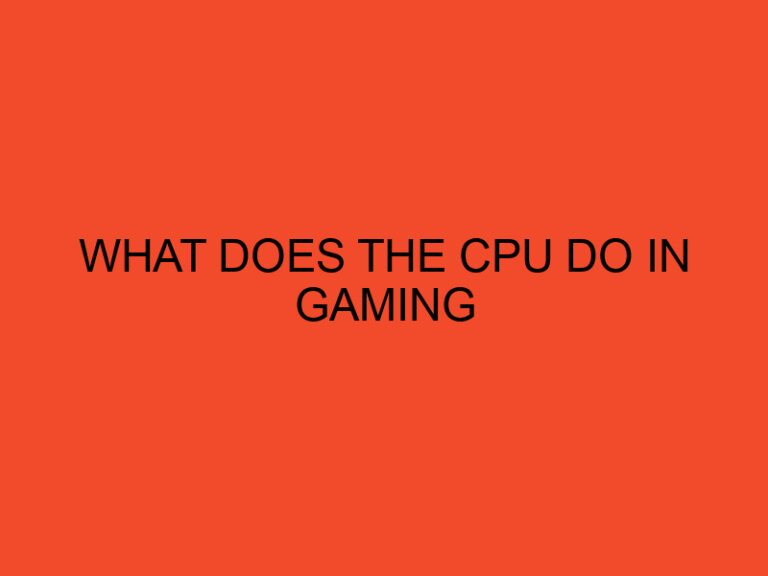Welcome to the world of gaming, where virtual realms and immersive experiences await. In this article, we delve into a phenomenon that haunts both casual and competitive gamers alike: ghosting. Whether you’re a seasoned gamer or new to the scene, understanding what ghosting is and its implications will help you navigate the gaming landscape with more awareness and fairness.
Table of Contents
- Definition of Ghosting in Gaming
- The Origins of Ghosting
- How Ghosting Affects Gameplay
- Types of Ghosting
- Common Causes of Ghosting
- Impact of Ghosting on Competitive Gaming
- Detecting and Preventing Ghosting
- Ethical Considerations in Ghosting
- The Future of Ghosting in Gaming
- Conclusion
- Frequently Asked Questions (FAQs)
Definition of Ghosting in Gaming
Ghosting in gaming refers to the act of gaining an unfair advantage by observing or obtaining information about an opponent without their knowledge or consent. It involves secretly accessing information, such as an opponent’s location, strategies, or upcoming moves, in real-time during a game. This information is typically obtained through unauthorized means, providing an unfair advantage and disrupting the balance of gameplay.
The Origins of Ghosting
The concept of ghosting predates video games and can be traced back to traditional sports and games. It originally referred to a team member who intentionally underperformed or sabotaged their own team, resulting in a disadvantage. In gaming, however, ghosting has evolved to encompass a different meaning, involving surreptitious information gathering rather than internal sabotage.
How Ghosting Affects Gameplay
Ghosting can have a significant impact on gameplay, affecting the overall experience and fairness for all participants. When a player ghosting gains access to information not available to other players, it disrupts the competitive balance, undermines skill-based achievements, and erodes the integrity of the game. It can lead to frustration, resentment, and an unfair advantage for those involved in ghosting.
Types of Ghosting
Ghosting manifests in different forms, each with its own implications for gameplay. Let’s explore three common types:
1. Visual Ghosting
Visual ghosting involves using external tools or software to manipulate the game’s graphics, revealing hidden information or providing a heightened visual advantage. This can include wallhacks, which allow players to see through walls, or radar hacks, which display the location of all players on the map.
2. Input Ghosting
Input ghosting occurs when a player intercepts or manipulates input signals between the gaming device and the game server. This enables the player to perform actions faster or with enhanced precision, giving them an unfair advantage over others.
3. Player Ghosting
Player ghosting is the act of gaining information about opponents through external means, such as watching their live streams or communicating with teammates who have access to their opponents’ strategies. This type of ghosting is often associated with online multiplayer games.
Common Causes of Ghosting
Several factors contribute to the occurrence of ghosting in gaming. Some common causes include:
- Lack of proper anti-cheat measures: Inadequate anti-cheat systems can create opportunities for players to exploit vulnerabilities and engage in ghosting activities.
- Competitive pressure: The desire to gain an advantage in highly competitive gaming environments can drive individuals to resort to ghosting.
- Monetary incentives: In some cases, players may engage in ghosting to secure monetary rewards or prizes associated with winning.
Impact of Ghosting on Competitive Gaming
Ghosting poses a significant threat to the integrity of competitive gaming. It undermines the skill-based nature of competitions and diminishes the accomplishments of players who adhere to fair play. The prevalence of ghosting can erode trust within gaming communities and discourage new players from participating, leading to a decline in overall engagement and interest.
Detecting and Preventing Ghosting
Efforts to detect and prevent ghosting continue to evolve alongside advancements in technology and gaming platforms. Game developers employ various measures to combat ghosting, including:
- Robust anti-cheat systems that detect and deter unauthorized activities.
- Encrypted communication protocols to protect against interception of input signals.
- Monitoring and moderation of online platforms to identify and address instances of player ghosting.
Additionally, players themselves can contribute to the prevention of ghosting by reporting suspicious activities, practicing fair play, and engaging in respectful gameplay.
Ethical Considerations in Ghosting
Ghosting raises important ethical considerations within the gaming community. While some argue that ghosting is an acceptable strategy, akin to gaining information through observation and deduction, the majority view it as a form of cheating that undermines the spirit of fair competition. Players and game developers must collectively address these ethical considerations to preserve the integrity of gaming.
The Future of Ghosting in Gaming
As gaming technology advances and new platforms emerge, the battle against ghosting continues. Game developers are investing in more sophisticated anti-cheat systems, machine learning algorithms, and behavioral analysis tools to combat ghosting effectively. The gaming community must remain vigilant and proactive in staying one step ahead to ensure fair and enjoyable gameplay experiences for all.
Conclusion
Ghosting in gaming is a persistent challenge that undermines fairness and disrupts the balance of competition. Understanding its various forms, causes, and impacts is essential for gamers, game developers, and the community as a whole. By taking proactive measures, fostering ethical standards, and implementing robust anti-cheat systems, we can combat ghosting and cultivate an inclusive and fair gaming environment.
Frequently Asked Questions (FAQs)
Can ghosting occur in both single-player and multiplayer games?
Ghosting primarily occurs in multiplayer games, where the competitive element is present. In single-player games, ghosting typically refers to accessing external guides or walkthroughs.
Are there any legal consequences for ghosting?
While ghosting is generally viewed as unethical within the gaming community, the legal implications may vary depending on the jurisdiction and the specific actions involved. In some cases, ghosting may violate terms of service or breach contractual agreements, leading to potential legal consequences.
How can I protect myself from being ghosted in multiplayer games?
To minimize the risk of being ghosted, you can take certain precautions, such as using reputable gaming platforms, enabling two-factor authentication, reporting suspicious activities, and playing with trusted friends or communities.
Can game developers track and punish ghosting activities?
Game developers have measures in place to detect and deter ghosting activities. They can track suspicious behaviors, issue warnings, impose temporary or permanent bans, and continually update their anti-cheat systems to address emerging techniques used by ghosters.
Does ghosting only occur in online games?
Ghosting primarily occurs in online multiplayer games where real-time interaction with other players is possible. However, ghosting in the form of unauthorized access to single-player game data or guides can also exist.






